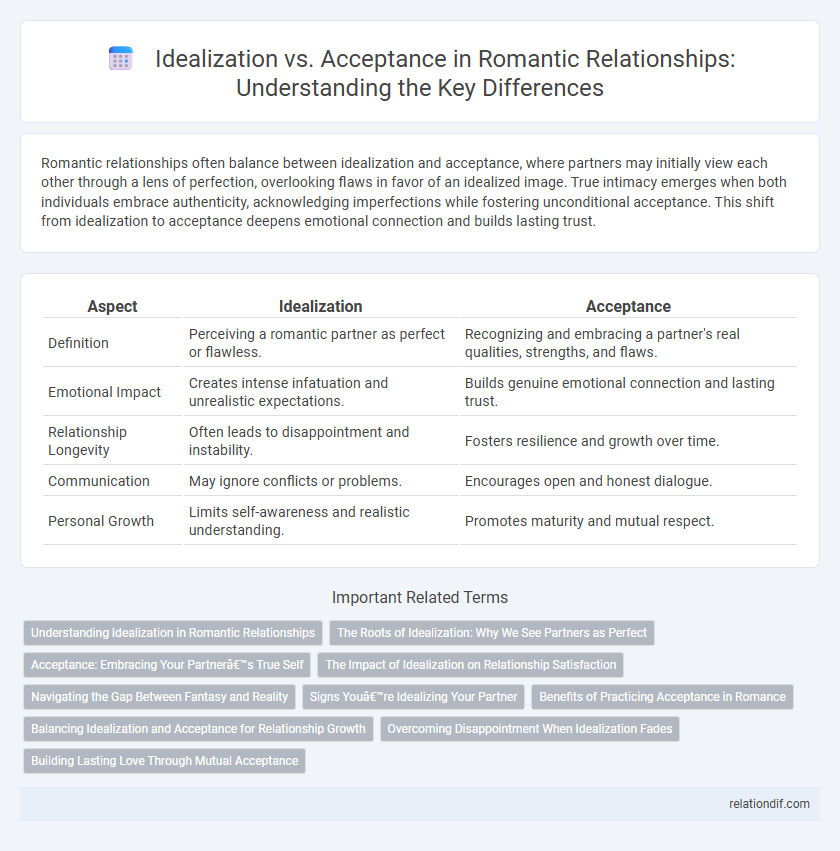Romantic relationships often balance between idealization and acceptance, where partners may initially view each other through a lens of perfection, overlooking flaws in favor of an idealized image. True intimacy emerges when both individuals embrace authenticity, acknowledging imperfections while fostering unconditional acceptance. This shift from idealization to acceptance deepens emotional connection and builds lasting trust.
Table of Comparison
| Aspect | Idealization | Acceptance |
|---|---|---|
| Definition | Perceiving a romantic partner as perfect or flawless. | Recognizing and embracing a partner's real qualities, strengths, and flaws. |
| Emotional Impact | Creates intense infatuation and unrealistic expectations. | Builds genuine emotional connection and lasting trust. |
| Relationship Longevity | Often leads to disappointment and instability. | Fosters resilience and growth over time. |
| Communication | May ignore conflicts or problems. | Encourages open and honest dialogue. |
| Personal Growth | Limits self-awareness and realistic understanding. | Promotes maturity and mutual respect. |
Understanding Idealization in Romantic Relationships
Idealization in romantic relationships often leads partners to project unrealistic traits onto each other, shaping expectations that may not align with reality. Recognizing these projections allows couples to move beyond surface-level admiration and cultivate genuine acceptance based on authentic understanding. Embracing acceptance fosters emotional intimacy, resilience, and a healthier dynamic grounded in mutual respect rather than idealized images.
The Roots of Idealization: Why We See Partners as Perfect
The roots of idealization in romance stem from cognitive biases and emotional needs that lead individuals to perceive partners as flawless, often amplifying desirable traits while minimizing flaws. This phenomenon is fueled by evolutionary drives for attachment and companionship, which encourage maintaining a positive image of loved ones to foster intimacy and commitment. Overcoming idealization requires conscious acceptance of a partner's imperfections, promoting genuine connection and emotional resilience in relationships.
Acceptance: Embracing Your Partner’s True Self
Embracing your partner's true self fosters a deeper and more authentic connection by valuing their unique qualities beyond superficial ideals. Acceptance promotes emotional intimacy and trust, allowing both partners to grow together without the pressure of unrealistic expectations. Prioritizing genuine understanding over idealization strengthens the foundation of lasting romantic relationships.
The Impact of Idealization on Relationship Satisfaction
Idealization in romance often inflates partner qualities, leading to unrealistic expectations that can cause disappointment and decreased relationship satisfaction. Couples who prioritize acceptance over idealization tend to develop stronger emotional bonds and healthier communication patterns. Embracing genuine partner traits fosters trust and long-term fulfillment more effectively than maintaining idealized illusions.
Navigating the Gap Between Fantasy and Reality
Navigating the gap between fantasy and reality in romance requires balancing idealization with acceptance of genuine flaws and imperfections. Embracing realistic expectations fosters deeper emotional connections and long-lasting relationships. A healthy romantic bond thrives when both partners recognize the difference between idealized visions and authentic experiences.
Signs You’re Idealizing Your Partner
Constantly overlooking your partner's flaws and only focusing on their positive traits signals idealization, which can prevent genuine connection. Expecting perfection or placing your partner on a pedestal often leads to disappointment and unrealistic relationship expectations. True intimacy grows through acceptance, recognizing both strengths and imperfections in your partner.
Benefits of Practicing Acceptance in Romance
Practicing acceptance in romance fosters deeper emotional intimacy by allowing partners to embrace each other's authentic selves without unrealistic expectations. This approach reduces conflicts rooted in idealization, promoting a healthier, more resilient relationship. Acceptance cultivates empathy and trust, creating a foundation for lasting connection and mutual growth.
Balancing Idealization and Acceptance for Relationship Growth
Balancing idealization and acceptance is crucial for relationship growth, as excessive idealization can lead to unrealistic expectations and disappointment, while acceptance fosters genuine understanding and emotional intimacy. Couples who embrace imperfections and communicate openly tend to build stronger, more resilient bonds, promoting long-term satisfaction. Integrating both perspectives enables partners to maintain passion without losing sight of reality, creating a healthy dynamic for sustained love.
Overcoming Disappointment When Idealization Fades
Idealization in romance often creates unrealistic expectations that lead to disappointment when reality emerges. Embracing acceptance allows partners to see each other's true qualities, fostering deeper connection and emotional resilience. Overcoming disappointment involves recognizing imperfections as part of authentic love rather than flaws to be fixed.
Building Lasting Love Through Mutual Acceptance
Building lasting love requires embracing mutual acceptance over idealization, allowing partners to appreciate each other's authentic strengths and imperfections. True connection deepens when both individuals prioritize understanding and empathy instead of unrealistic expectations. This foundation fosters resilience and emotional intimacy essential for enduring romantic relationships.
idealization vs acceptance Infographic

 relationdif.com
relationdif.com